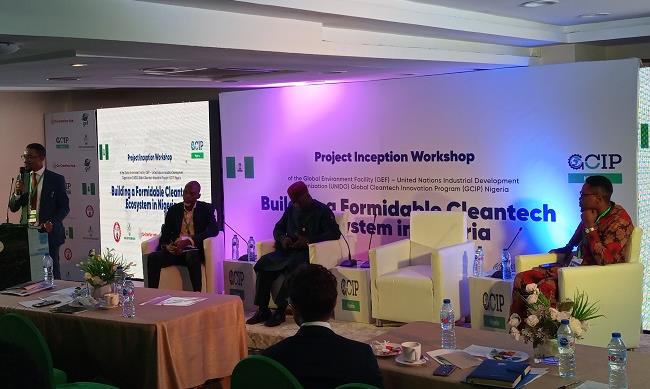The Federal Ministry of Science, Technology and Innovation (FMSTI) is currently conducting technology needs assessment for climate change mitigation and adaptation in key sectors of the economy.

Dr Adeleke Mamora, Minister of Science, Technology and Innovation, who made the disclosure on Thursday, August 18, 2022, in Lagos, stated that this is being done in the light of the fact that the world is currently moving towards the use of clean energy technology.
And, adopting innovative clean technologies is critical for climate action without compromising economic and industrial development.
The minister spoke at the Project Inception Workshop of the Global Cleantech Innovation Programme (GCIP) in Nigeria, an initiative being promoted by the United Nations Industrial Development Organisation (UNIDO) and the Global Environmental Facility (GEF).
Dr Mamora had on Tuesday, August 16 inaugurated a 13-member Project Steering Committee (PSC) of the GCIP, a programme designed to unleash the potential of clean-tech innovation and entrepreneurship and respond to the increasing global demand for environmental sustainability and climate action.
Represented by Dr. Peter Ekweozoh, Director of Environmental Sciences and Technology in the FMSTI, Mamora said in a keynote address that the global move towards clean energy for climate change mitigation and adaptation is one Nigeria hopes to adopt in key sectors of the economy.
He said: “I am informed that the GCIP – Nigeria is to be implemented over the next three years in three components.
“While component one is to be coordinated by the private sector, represented by Co-Creation Hub; component two is being implemented by the public sector, driven by FMSTI and Rural Electrification Agency (REA). While UNIDO is in charge of component three.
“It is pertinent to note that the world is currently moving towards the use of clean energy technology and FMSTI being aware of this is currently conducting technology needs assessment for climate change mitigation and adaptation in key sectors of the economy.
“There can be no better time to commence this project than now. I therefore call on all Nigerians, especially the young ones, to embrace and support deployment of clean energy innovations and solutions across the various sectors of the Nigerian economy.”
Jean Bankole, Regional Director, UNIDO Nigeria, represented by Reuben Bamidele, National Programme Officer, UNIDO Nigeria, said the programme was designed to help SMEs and startups scale on a global level.
“This programme will help small and medium enterprises and identity startups to compete on a global market and connect them with potential investors, customers and partners through the global clean-tech network,” he said.
“The GCIP will help startups and SMEs in Nigeria to focus on promoting local clean technologies in order to achieve the sustainable development goals 7 and 13.”
Bosun Tijani, Chief Executive Officer, Co-Creation Hub, said the project was significant as it was the first time the government, together with its partners, would be prioritising the development of the innovative ecosystem for clean technology in Nigeria.
The GCIP Nigeria, which consists of three pillars, will be part of the GCIP Network, which will connect countries globally. Presently, 10 country projects have been approved under the GCIP Framework umbrella: Cambodia, Indonesia, Kazakhstan, Moldova, Morocco, Nigeria, South Africa, Turkey, Ukraine and Uruguay. Other five stand-alone projects are currently under development.
The GCIP Nigeria is expected to have an impact on greenhouse gas (GHG) emission reduction, industrial development, job creation and energy access. Regarding the latter, a financial mechanism will be established (and operated by REA) to support startups whose solutions help improve energy access.
